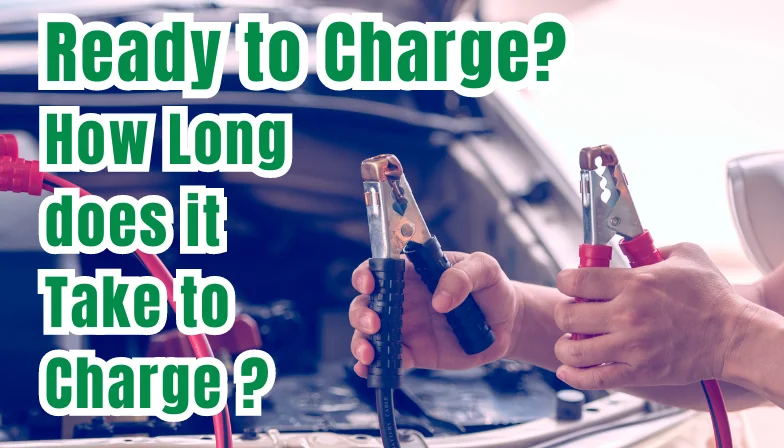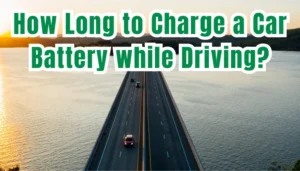Table of Content
Maximize Efficiency: How to Charge a Car Battery in Record Time
You don’t need to be an automotive expert to charge a car battery, although it might help. Just grab the right charger, (Click to Learn How to Choose the Right Car Battery Charger) read the instructions, and zap the juice back into your wheeled friend. You’ll need to be patient, though — the speed at which a car battery charges is dependent upon a couple of factors. The charging state of your battery plays a role, but so does its capacity, charger charge rate, and charger type. Here’s a look at these specifics, and a general model of how long it takes to charge a car battery.
Step 1- Understanding Car Battery Capacity

Car batteries are rated in something called ampere-hours, abbreviated as Ah, which essentially measures their storage capacity for electrical energy. For instance, a battery rated at 48 Ah can supply 1 ampere of current for a duration of 48 hours. If the demand increases to 2 amps, the battery’s lifespan shortens to 24 hours. This capacity to supply power, or the “energy tank” size if you will, varies significantly based on the battery’s design and the specific model of the car it’s intended for.
Step 2- Checking the Discharge Level of Car Battery
Before starting to charge a car battery, it is necessary to check the condition of the battery. At that moment, we need to determine its current capacity. A fully discharged battery will take more time to fully charge compared to a battery with moderate capacity or less. In general, a car battery is considered significantly discharged if it reads much less than 10 volts when measured with a multimeter. If the value is close to 5 Volts, it is considered to be below approximately 75% of the total capacity. So remember that the starting point of your battery’s charge plays a big role in how long the charge will last.
Step 3- Charging Rate and Charger Types
Battery chargers, like batteries, are available in various types and charging capacities with values in amperes. A basic car battery charger can provide a slow charge of approximately 2-4 amps of current, while more advanced models can provide a faster charging current of 10 amps or more. These current values vary depending on the type of battery charger and its intended use.
(Click to Learn Types of Car Battery Chargers)
Here’s a rough guide:
- Trickle Charger (0.5-2 amps): Ideal for maintaining a charge for a long time. A fully discharged battery may take 24 hours or more to fully charge. Additionally, these types of battery chargers are included in the smart battery chargers group.
(Click to See a Sample of Trickle Car Battery Chargers)
- Standard Charger (4-10 amps): It usually takes about 6-12 hours to fully charge a battery, making it a good option for overnight charging. However, it should be checked manually to prevent the battery from being overcharged and damaging its life.
(Click to See a Sample of Standart Car Battery Chargers)
- Fast Charger (12+ amps): Can charge a battery in approximately 4-6 hours. However, it is important to monitor the charging process closely to prevent overcharging. Nowadays, smart battery chargers that can charge quickly are also available on the market. However, if you have a battery that loses power frequently, constantly charging it with fast charging can seriously damage the battery.
Factors Affecting Charging Time
- Battery Age and Condition: Older batteries or those in poor condition may take longer to charge or might not hold a full charge.
- Temperature: Battery charging is less efficient in extremely cold or hot temperatures, potentially prolonging the charging process.
- Charger Quality: High-quality chargers can optimize charging time and extend battery life by preventing overcharging.
Conclusion
The time taken to “Charge a Car Battery” can vary greatly depending on a number of factors, including the output of the charger and the initial state of the battery. As a general rule of thumb, it takes between 4 and 24 hours to fully charge a car battery, taking into account the specific conditions we have outlined so far. Always refer to the manufacturer’s instructions for both your battery and charger to ensure that you are charging your battery safely and effectively. Remember, regular maintenance and proper charging can significantly extend the life of your vehicle’s battery and ensure it is ready to go when you need it.
Please note that this post contains affiliate links. This means if you click on a link and make a purchase, we may receive a small commission at no extra cost to you. Our reviews and recommendations are based on our own opinions and analysis, and we aim to provide you with the most accurate and helpful information to make your decisions. Your support helps us continue to provide valuable content. Thank you for your understanding and support.



